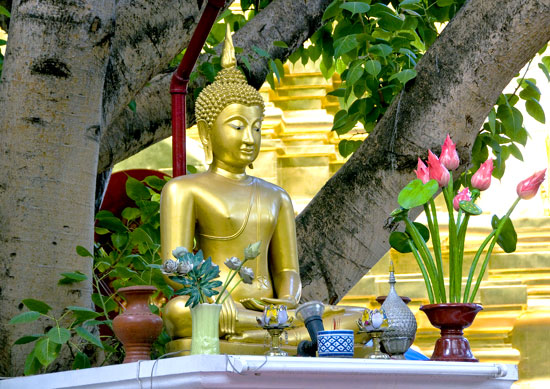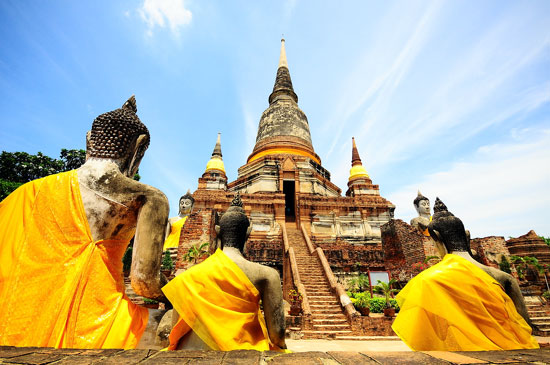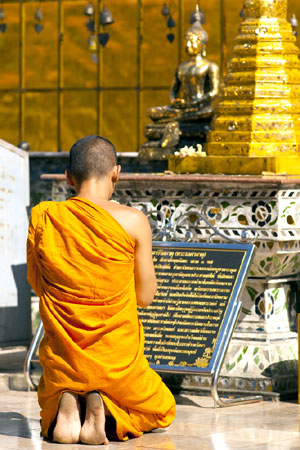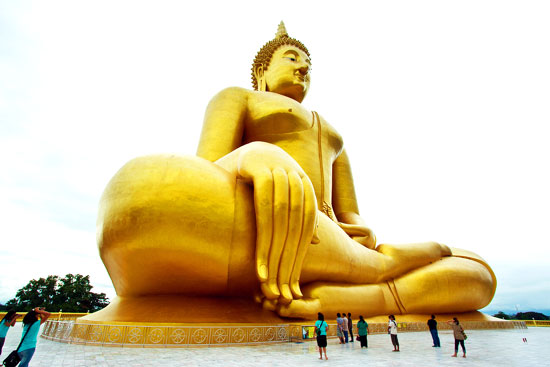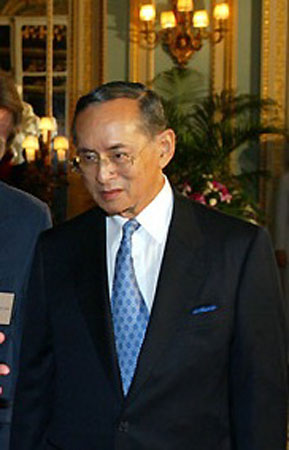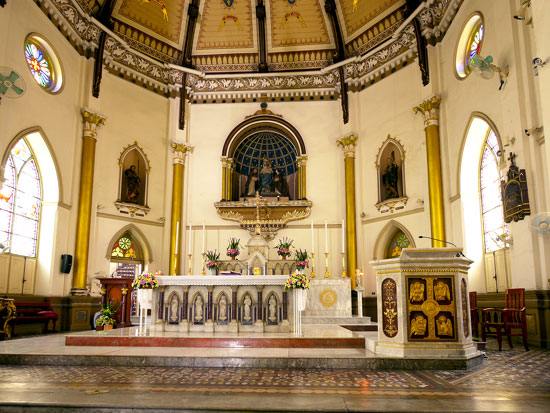Culture and Society: Religion Overview
Religions of the Country
The predominant religion of Thailand is Theravada Buddhism, which is followed by almost the entire population. Even though there is no official religion in Thailand, Buddhism is the de facto state religion.
Muslims represent 5 percent of the population, and Christians, Confucians, Hindus, Jews, Sikhs, Taoists, and animists represent the rest.
Basic Tenets
The basic tenets of Buddhism are profound in their simplicity and are stated in the "Four Noble Truths" enunciated by Siddatha Gotama (Pali. Siddhartha Gouthama in Sanskrit) who became the historical Buddha or "the enlightened one," in the 6th century B.C. They are as follows: existence is dukkha (suffering); the cause of dukkha is trishna (craving, attachment); the state of nirvana (liberation, enlightenment, and the "extinction" of personality and personal desires) is the end of all suffering; the way to end all dukkha and achieve nirvana is through the practice of the Eightfold Path (right view, right thought, right speech, right action, right livelihood, right effort, right awareness, and right concentration).
Buddhists, like Hindus, believe in karma (the total effect of action and conduct during several lives, creating the destiny of the individual) and samsara (the idea that living beings are inescapably trapped in a cosmic juggernaut of continuous cycles of birth-death-rebirth due to their karma). The concept of karuna (compassion) is an integral part of the Buddha’s teachings, the motive force for all his actions, and the main virtue he expected of his followers.
Buddhists give much importance to meditation practices and the observance of moral precepts. For lay Buddhists, who may be unable to practice difficult meditation methods, acquiring "merit" through moral actions is the way towards enlightenment. Interestingly, the Buddha had nothing to say about God, and the ultimate aim of this rational religion is to end misery by becoming enlightened, like he was.
Theravada Buddhism is the oldest and most conservative school of Buddhism, as opposed to later schools like Mahayana ("the great vehicle," popular in China) and Vajrayana ("the Diamond Vehicle," found in Tibet). The non-theistic Theravada is the earliest and strictest school of Buddhism and subscribes to the Buddhist canon of the tipitika (the "triple basket" of early Buddhist scriptures), which were written in the now-extinct Pali language.
Spiritually Devout or Secular
Buddhism has inextricable links with the social and cultural ethos of Thailand. Educated Thais study the teachings of the Buddha and try to acquire merit through charitable acts like feeding the monks and supporting Buddhist establishments. Ordinary people enthusiastically participate in temple festivals and celebrations.
Religious Conflict
The various religious communities in Thailand have generally lived amicably together. However, the Muslim insurgency in the southern regions has fractured religious amity. Radical Islamists hoping to provoke a backlash have targeted Buddhist monks many times, and many Muslim men have died in police custody after violent protests.
Secularism
Buddhism is the de facto state religion of Thailand, and the King is its anointed protector. There is no organized secular movement in the country.
Superstitions
Thais believe that every house has a spirit in it and the spirit has to be propitiated by offering fruit, rice, or tea. Another belief is that you must not whistle at night unless you want to invite ghosts into your house.
According to Thai myth, in the beginning, the Earth was empty of plants, animals and humans, and there was no Sun, Moon, or stars. Then the Spirit of the Sky, Than, created everything out of nothing. Than pierced a bottle gourd, and out came five kinds of humans (all brothers and sisters) who were let loose on Earth with the tools necessary to make a living. Than also created the plants and animals and populated the whole world through his creations.
Another myth says that the original rice seed was five times as big as a person’s fist. The rice seed became smaller as the greed of humans increased until it reached its present size.
Religious Clerics
The large numbers of Buddhist monks in Thailand are the most visible image of Theravada Buddhism in the country. The monks have been the custodians of Buddha’s teachings in unbroken succession through the centuries. They also officiate during ceremonial occasions. Monks are highly esteemed in Thailand and lay people avidly practice the meritorious action of feeding the monks.
Aspiring Buddhist monks receive their clerical training in the various monasteries in Thailand. Students start their education by serving as dek wat or "temple kids" to elder monks. Aside from religious training, they also receive basic education at these monasteries.
State Regulations
Thailand’s Constitution has a provision mandating the government to "patronize and protect Buddhism and other religions," so the Thai government gives financial assistance to Buddhist, Christian, Islamic, Hindu, Sikh, and other religious institutions. The government established an agency called the National Buddhism Bureau in 2002 and funded it with $56.5 million in 2006. The agency regulates Buddhist clerics and approves Buddhist religious teaching curricula for use in temples and other Buddhist educational institutions.
Religion and Public Life
Buddhism occupies a prominent place in Thai public life. It permeates the cultural ethos of Thailand. Buddhist monks officiated at the coronation of Thailand’s King, who is the anointed protector of Buddhist religion in Thailand. Buddhist rituals are invariably performed during births, weddings, housewarmings, funerals, openings of business establishments, and the buying of vehicles.
Meditation occupies a prominent place in Buddhist religious practices. Meditation was considered, in the past, as the prerogative of only monks. These days, however, a large number of Thais of all classes and age groups are taking up meditative practices, particularly the Vipassana meditation popularized by Burmese-born Indian lay teacher S.N. Goenka.
Religious Holidays and Ceremonies
Most of the religious holidays in Thailand are Buddhist holidays. They include the Lunar New Year, Makka Bucha, Visakha (Buddha Day), Asatha Bucha Day, and Khao Phansa (Beginning of Buddhist Lent).
The most important religious ceremonies in Thailand are births, ordination, marriages, and funerals. Parents often consult Buddhist monks for the right name for their children. In central Thailand, parents practice the Khawn ceremony of tonsuring the baby when it is one month old.
Ordination as a monk is supposed to be one way to earn merit for the deceased souls of one’s parents and relatives. Becoming a monk involves the donning of the saffron robe and usually takes place in the month of July.
Buddhist monks also take part in wedding and funeral rites, as the Buddhists view the former as a sacred bond between a man and woman and the latter as a passage to another (maybe better) life.
Government and Religion
Buddhism is the de facto national religion of Thailand. Only a Buddhist can become the King, who is the anointed protector of Buddhism in Thailand. The Thai government is neither anti-religious nor controlling towards religions. The government gives financial assistance to minority religions, although the largest part of government funding goes to Buddhist institutions. The laws of Thailand are not a reflection of any religion, even though there is ideological interdependence between Buddhism and the Thai state.
Persecution
Thai government does not persecute outside religions. There is a quota system that limits the number of foreign missionaries. However, many unregistered missionaries are active in the country.
There are no laws against proselytizing in Thailand. Buddhists, Christians, and Muslims are active in proselytizing, with Christians having the edge in proselytizing success. All registered foreign religious groups are free to conduct their services without hindrance.
Anyone is free to possess Bibles or other religious literature in Thailand. The Bible Society of Thailand distributed more than 40,000 Bibles in 2005. Foreigners are also free to display their religious symbols or icons.
Religious Tolerance
There has been a great deal of religious tolerance in Thailand. The predominant Buddhist religion is very tolerant and has amicable relations with religious minorities. However, the Muslim insurgency in the South has fractured this traditional religious amity. Islamic extremists have murdered many Buddhist monks, and Muslim youths have died in Thai police custody.
Foreign missionaries and evangelical groups are active in the country, and many missionaries draw comparisons between Christian precepts and the Four Noble Truths and Eight-fold Pat. Christian proselytizing is accepted by the local culture, though traditional Buddhist monks view it with wariness.
Protocols for Foreigners
Foreigners are free to participate in the religious activities and rituals of Thailand, but should show due respect to Buddhist sensibilities by wearing appropriate clothing (long sleeves, modest necklines, long pants/skirts) in temples. Foreigners should show proper reverence to Buddhist temples and statues. Women should never touch Buddhist monks or even cross their paths.
Copyright © 1993—2025 World Trade Press. All rights reserved.

 Thailand
Thailand 